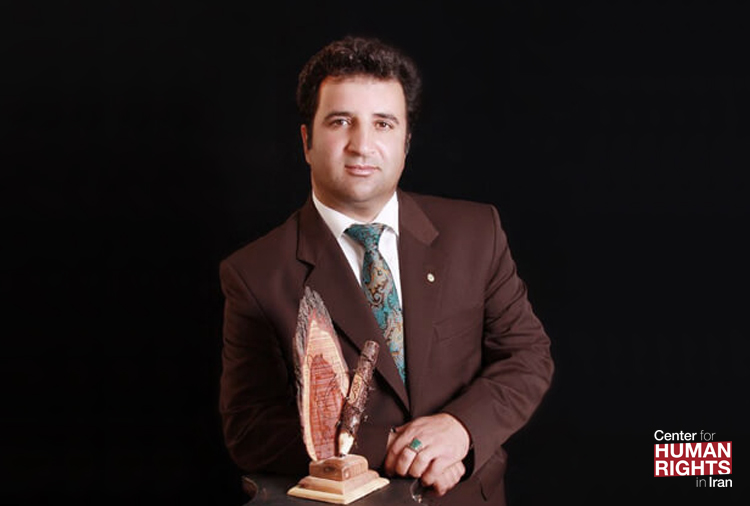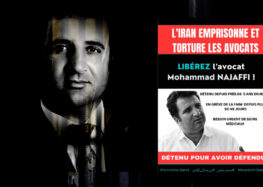Attorney Must Be Released from Prison in Iran While Case is Under Appeal

Mohammad Najafi May Also Be Flogged Despite Health Concerns
November 12, 2018—The attorney Mohammad Najafi is being imprisoned unlawfully while his appeal process is underway and should be released immediately, said the Center for Human Rights in Iran (CHRI). His sentence, including the 74 lashes he was assigned, should be suspended as Iranian judicial processes dictate, said CHRI.
Najafi was sentenced to three years in prison and 74 lashes for “disturbing the state” and “publishing falsehoods” in connection with his public dispute of the alleged suicide of a protester who died while in police custody in Arak, the capital of Markazi Province.
“Najafi’s sentence of prison and lashes for questioning a detainee’s death was a travesty of justice to begin with, and now the authorities will not even allow Iranian legal procedures to be carried out,” said Hadi Ghaemi, CHRI executive director.
“Iran is violating its own laws in its zeal to punish an attorney who dared to speak out against state abuses,” Ghaemi added.
Najafi’s lawyer, Payam Derafshan said in an interview with CHRI on November 3 that Najafi, who has been held in Arak’s Central Prison since October 28, 2018, should be free until the final verdict is issued since the appeals process has not been completed.
“We filed a complaint with the Supreme Court to object to the completely false and unlawful indictment and to the unjust sentence against this brave lawyer,” Derafshan told CHRI. “Our petition was registered and accepted on October 28.”
“Ten minutes later, we received a message that Mr. Najafi’s sentence had been submitted for enforcement,” he added. “By law, when the Supreme Court agrees to review a case, the enforcement of the sentence is suspended, but instead he has been hastily taken to prison.”
Article 478 of Iran’s Criminal Procedures Regulations states: “Any time the Supreme Court agrees to carry out a judicial review, enforcing the sentence will be suspended until a new verdict is issued.”
Derafshan continued: “The correct judicial procedure is that first a warrant must be issued to surrender [to prison] within five or ten days. If he does not surrender, a warning is sent to the person who paid the bail to produce him to the authorities within 20 days. None of these steps were taken. Instead, they suddenly arrested him without any legal warning.”
Article 171 of Iran’s Criminal Procedures Regulations states: “The time between issuing a warrant and the suspect’s appearance in front of a judicial authority should not be less than five days.”
Derafshan also noted if the lashing sentence was carried out, Najafi’s wounds would take longer to heal because of his advanced diabetes “and may lead to irreversible consequences.”
“We have submitted a medical report to the presiding judge and tried to inform the public as much as possible because flogging someone is not only beneath human dignity but in the case of Mr. Najafi, it is also illegal and dangerous because of his medical condition,” the attorney told CHRI.
The United Nations has declared that flogging is a cruel and inhuman punishment tantamount to torture.
“Najafi’s health issues alone should immediately trigger the suspension of the flogging sentence, said Ghaemi. “The authorities will be responsible for any harm that comes to this brave attorney.”
Derafshan said his client is also facing prosecution in other cases on similar charges. “He has been slapped with charges in every city and village he made a speech as well as his online posts,” he said.
In January 2018, Najafi informed media outlets about the suspicious case of Vahid Heydari, 22, who died in detention at the 12th Police Station in Arak sometime between the end of December 2017 and the beginning of January 2018.






